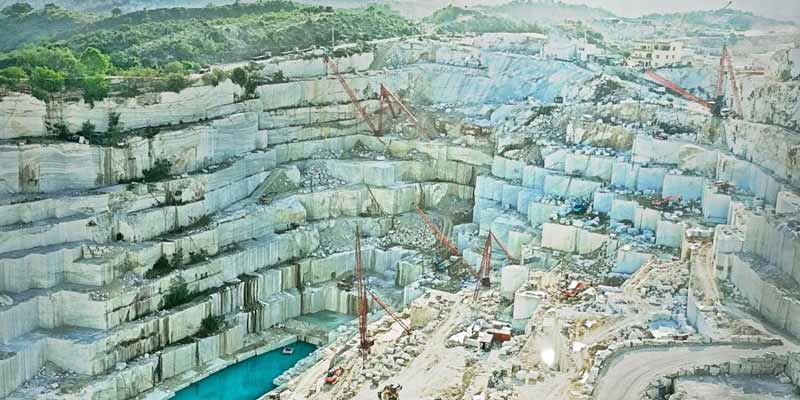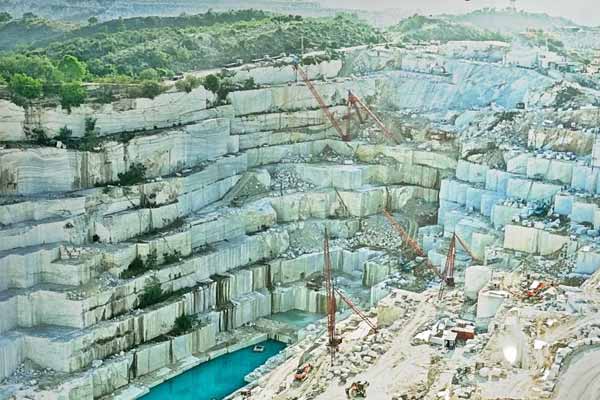Rajsamand – The Marble City, is a town located in the state of Rajasthan, India. It is situated in the Rajsamand District, which is named after the town itself. Rajsamand is known for its rich heritage, stunning architecture, and the marble industry that has thrived in the region for centuries.
The town gets its name from the Rajsamand Lake, a picturesque artificial lake built in the 17th century by Maharana Raj Singh of Mewar. The lake is a major attraction and a hub of various recreational activities. It is surrounded by beautiful gardens, pavilions, and temples, making it a popular tourist spot Rajsamand – The Marble City.
One of the key features of Rajsamand – The Marble City is its association with the marble industry. The region is famous for its high-quality marble, which has been used in the construction of several iconic structures in India and abroad. The marble from Rajsamand is known for its pure white color, fine texture, and durability. The marble quarries in the region provide employment to a significant portion of the local population Rajasthan Tourism.
In addition to its association with marble, Rajsamand – The Marble City is home to many historical landmarks. One of the notable attractions is the Kumbhalgarh Fort, located about 20 kilometers from the town. Built during the 15th century, the fort is a UNESCO World Heritage Site and is renowned for its impressive walls that stretch over 36 kilometers, making them the second-longest continuous wall after the Great Wall of China. The fort offers panoramic views of the surrounding Aravalli hills and is a popular destination for tourists and history enthusiasts.
Rajsamand – The Marble City is also known for its rich cultural heritage. The region celebrates various festivals and fairs throughout the year, where locals and visitors can witness traditional dances, music performances, and participate in cultural activities. The Mewar Festival, celebrated in March-April, is particularly famous and showcases the vibrant culture and traditions of the region.
Overall, Rajsamand, or the Marble City, offers a unique blend of natural beauty, historical significance, and cultural richness. It attracts tourists from all over the world who come to admire the stunning architecture, explore the marble industry, and soak in the rich heritage of this charming town Rajasthan Monuments.

History of Rajsamand
The History of Rajsamand, or the Marble City, is closely intertwined with the history of the region of Mewar in Rajasthan, India. The area has a rich and ancient past dating back several centuries Rajsamand – The Marble City.
The region of Mewar was ruled by the Sisodia Rajputs, who established their kingdom in the 8th century. Rajsamand came into prominence during the reign of Maharana Raj Singh I, who ruled Mewar from 1653 to 1680. He is credited with the construction of the Rajsamand Lake, which was built in 1660. The lake was created to provide a source of water for irrigation and to combat the recurring droughts in the region Rajasthan Budget Tours.
The Rajsamand Lake is not only a reservoir but also a monumental work of art. The construction of the lake was accompanied by the creation of a grand embankment and a series of beautifully carved pavilions and chhatris (cenotaphs). The marble used in these structures was sourced locally, marking the beginning of the marble industry in Rajsamand.
During the rule of Maharana Raj Singh, Rajsamand flourished as a center of art, culture, and trade. The marble industry thrived, and the town became renowned for its skilled craftsmen who carved intricate designs on marble. The marble from Rajsamand was used in the construction of many important structures, including temples, palaces, and public buildings Tourist Places Rajasthan.
Rajsamand’s association with marble continued to grow over the centuries. The marble quarries in the region supplied high-quality marble for various construction projects across India and even overseas. The craftsmanship of the local artisans gained recognition, and Rajsamand – The Marble City became known as the Marble City.
Apart from its association with marble, Rajsamand has witnessed several historical events. The region was a significant part of the Mewar Kingdom, which fiercely resisted the Mughal rule. The rulers of Mewar, including Maharana Pratap, played a crucial role in defending their kingdom and maintaining their independence.
Today, Rajsamand is a thriving town with a mix of traditional and modern elements. It attracts tourists and traders from around the world who come to explore the marble industry, visit historical sites such as the Kumbhalgarh Fort, and experience the vibrant culture of the region Rajsamand – The Marble City.
The history of Rajsamand is a testament to the rich heritage and artistic legacy of the region. It continues to be celebrated as the Marble City, showcasing the skilled craftsmanship and timeless beauty of marble in its various forms.
Best Time To Visit Rajsamand
The best time to visit Rajsamand is during the winter season, which lasts from November to February. The weather during this time is pleasant and comfortable, with temperatures ranging from around 10°C to 25°C (50°F to 77°F). The days are sunny and ideal for exploring the outdoor attractions, while the nights can be a bit chilly.
Visiting Rajsamand – The Marble City during the winter season allows you to avoid the scorching heat of the summer months, which can be quite intense in Rajasthan. The temperatures during summer, from April to June, can reach up to 40°C (104°F) or higher, making it uncomfortable for outdoor activities.
Monsoon season, from July to September, brings rainfall to the region. While the landscape becomes lush and green during this time, it is advisable to check the weather conditions before planning a visit, as heavy rainfall can disrupt travel plans and limit outdoor exploration Rajsamand – The Marble City.
Overall, the winter season is considered the best time to visit Rajsamand due to its pleasant weather, allowing you to enjoy the attractions, historical sites, and the natural beauty of the region comfortably. However, it’s always a good idea to check the local weather forecast before planning your trip to ensure a pleasant and hassle-free visit.
How To Reach Rajsamand – The Marble City
Rajsamand, also known as the Marble City, is well-connected by road and rail. Here are the different modes of transportation you can use to reach Rajsamand – The Marble City:
By Air: The nearest airport to Rajsamand is Maharana Pratap Airport, also known as Udaipur Airport, located in Udaipur, which is approximately 75 kilometers away from Rajsamand. From the airport, you can hire a taxi or take a bus to reach Rajsamand.
By Train: Rajsamand has its own railway station, called Rajsamand Railway Station, which is well-connected to major cities in Rajasthan and other parts of the country. Several trains ply to and from Rajsamand, making it a convenient mode of transportation. From the railway station, you can hire a taxi or take a local bus to reach your desired destination in Rajsamand – The Marble City.
By Road: Rajsamand is well-connected by road, and you can reach the city via national highways and state highways. The town is situated on National Highway 8, which connects it to major cities like Udaipur, Jaipur, and Ahmedabad. You can either drive your own vehicle or hire a taxi to reach Rajsamand. Regular bus services are also available from nearby cities and towns to Rajsamand.
Local Transportation: Once you reach Rajsamand – The Marble City, you can explore the city and its attractions using local transportation options like auto-rickshaws and taxis. These are readily available and can be hired for local sightseeing or to travel within the town.
It is advisable to check the schedules and availability of transportation options before planning your trip to Rajsamand to ensure a smooth and comfortable journey.
